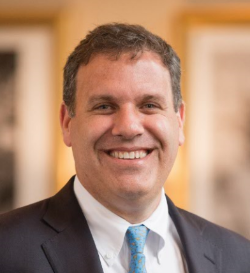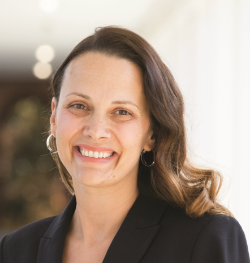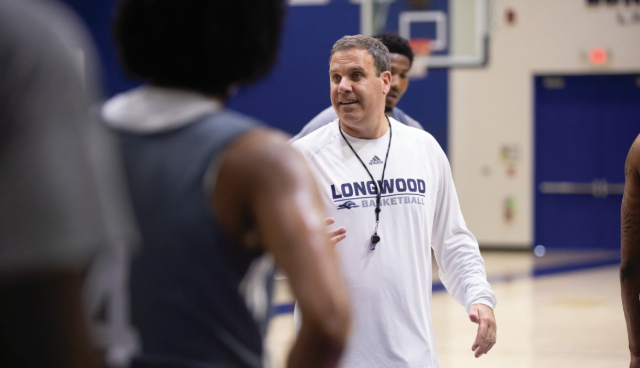Griff Aldrich and Rebecca Tillett may have taken two very different paths to Longwood, but they share one powerful mission: developing young people as students, leaders and people through the game of basketball.
Longwood introduced its two new head basketball coaches in April, announcing Aldrich as head coach of men’s basketball and Tillett as head coach of the women’s program in a joint press conference and reception that drew more than 100 people to the Maugans Alumni Center.
Since then, both Aldrich and Tillett have gotten to work assembling their staffs and bringing in their first recruiting classes—each taking the first steps toward realizing their vision for their respective programs.
You’ve both taken unique career paths to becoming college head coaches. Coach Aldrich, you had a successful career in law, private equity and the energy industry while also coaching AAU basketball on the side. Coach Tillett, you really went into the family business, following both your parents in becoming a teacher and a highly successful high-school coach in Virginia before making the jump to college sports at Navy. Why did each of you decide to make your respective switches, and how did those previous careers prepare you to be a successful college coach?
GA: I’d gotten to a point in life where I was coaching urban youth in Houston, and every day it was the highlight of my day. While I had an exciting and enjoyable career at the time in private equity, I was still waking up every morning thinking about coaching and basketball. The game has always been a major part of my life, and, as I evolved over the past several years, I’d been thinking about how I wanted to spend my time and my life. Ultimately, investing in young men through the sport of basketball came to the forefront.
Those earlier experiences taught me how to be highly intentional, goal-oriented and task-oriented. In my prior career in law and finance, you really needed to know where you were going and your strategy to achieve success. Whether that was cultivating more clients or securing a deal in the private equity realm or building the right portfolio of assets, you had to have a strategy, and then you had to put the process together to execute the strategy and achieve your vision.
RT: I loved being a teacher. I had a wide variety of subject areas I taught, but my favorite subject is basketball. To spend all day thinking about and planning basketball, and to unite other women who are passionate about it and give them opportunities to achieve their goals, that’s a dream come true.
There’s a lot of similarity between teaching and coaching, too. We say in my own family, ‘The court is our classroom.’ Having that background as a teacher, you tend to look at your players on the court as students in a classroom. You’re teaching them the offense, teaching them the defense, and, as you would as a teacher, you have to assess where they are. You have to know how and when to intervene to speed up that process of learning. If your team’s not doing well at something, you have to reflect as a coach and regroup. It’s the same thing in a classroom. If your whole class does poorly on a test, then your instruction needs to improve. I try to look at it through that lens.
Coach Tillett, what do you feel your student-athletes can learn on the court beyond simply learning how to play the game better?
RT: With our team right now, we definitely use the word ‘tough.’ I keep encouraging them that they are tough women and that they’re capable of so much. Through sport you’re pushed to what you perceive your limits to be, and then you have so many opportunities presented to you to push beyond that. That’s definitely where we are right now with our team: What are our perceived limits? And then, as a staff, it’s our job to push them past that.
Lessons in sports translate to everything we do in our lives. The things that we’re working on and talking about in practice help our players become successful mothers, business women, sisters, friends; all of those things translate to more than just basketball.
Rebecca Tillett began her career as an award- winning teacher and successful high-school coach in Virginia. She comes to Longwood from the U.S. Naval Academy, where, as associate head coach, she helped lead the women’s team to a record-setting season in 2017-18. (Photo courtesy of Mike Kropf ’14)
Coach Aldrich, how do you approach decision making for the men’s program?
GA: I think with our staff and our program, we really tried to establish early on who we want to be and what we want our culture to be. Once you have that vision, it’s easier to make decisions. Is this the right staff member? Are these the right players to bring in? Do they fit? Are these the right activities for the program to undertake? These are easier decisions when you know who you are and where you want to go.
Lessons in sports translate to everything we do in our lives. The things that we’re working on and talking about in practice help our players become successful mothers, business women, sisters, friends; all of those things translate to more than just basketball.
Rebecca Tillett, Head Women’s Coach
Developing citizen leaders is a crucial piece of Longwood’s mission as an institution. What does that term mean to you, and how do you contribute to that universitywide mission through basketball?
GA: A citizen leader to me is somebody who’s a part of a community. They are a citizen first, and they understand they’re a part of something greater than themselves. For our basketball team, it’s important for each of our players to understand they’re part of a broader university community and a broader Farmville community. They have an obligation and a responsibility to contribute to those.
We’re all leaders in our own right. We all have spheres of influence. These young men, as Division I basketball players, have a larger platform than many other students. They need to understand that not only are they a part of the community, but they wield influence throughout the community not just through their play on the court but also in their interactions with students, faculty and people around Farmville and on campus. We talk about that, and we talk about the importance of representing themselves, the team and the university well.
Griff Aldrich comes to Longwood from 2018 NCAA Tournament darling UMBC (University of Maryland, Baltimore County), where he was director of recruiting and program development and acted as chief of staff for head coach Ryan Odom. He had a successful law and business career before turning to basketball full time. (Photo courtesy of Mike Kropf ’14)
RT: I think citizen leadership is critical, especially at this time in history. The fact that Longwood is at the forefront of that and makes it such a big part of what we do here is inspiring. In our program, we’ve implemented our Leadership Council, which is something I started as a high-school coach. It’s been so impactful everywhere we’ve been, and we still do it today. It’s a team-centric leadership development program that requires our players to apply and interview as part of the selection process. They submit a résumé and a cover letter, and they sit down with the staff to tell us why they should be a part of it. Not everybody is selected, but we put those who are through some really impactful leadership training.
This year we had eight women apply, and we selected four: Kristina Antonenko, Stephanie Guihon, Mallory Odell and Kate Spradlin. They’re going to delve into ideas of leadership and serving our team, which is a small case study of what Longwood’s bigger picture mission of citizen leadership. I’m really grateful that we had eight players apply and take that risk. I’ve never had that many people be interested year one.
For our basketball team, it’s important for each of our players to understand they’re a part of a broader university community and a broader Farmville community. They have an obligation and a responsibility to contribute to those.
Griff Aldrich, Head Men’s Coach
You’ve both been here for a full preseason, and you’re on the cusp of your first games as college head coaches. What have been your priorities since you arrived, and what progress have you made with your teams so far?
RT: I think the biggest priority the first few months was getting a really talented, committed staff in place. I’m really, really thrilled about the women we have leading our team. They’ve all accomplished a lot in their careers, and they all have a commitment to making Longwood great.
Another priority definitely has been establishing the culture of our program. Some of that comes from what I was talking about earlier when I mentioned toughness. We want to have that mind-set of, “Let’s be strong, tough women who can handle a lot of things.” During the preseason, we put in Marine Corps training, and that’s allowed our women to complete mental and physical challenges with a local sergeant in Farmville. You can already see those things translate to practice, so that was a big priority for us.
We’ve also made a commitment to getting out in the community, and it’s all contributed to developing this culture of family with our women, of supporting one another and of achieving and competing.
GA: For us, our main priorities are two-fold. One is beginning to establish the culture that we believe is able to build a sustainable and successful program. Two is developing relationships with the players and trying to get to know them. I would say that, as far as the player relationships, it’s always easier with some and harder with others, but we are continuing to get to know the guys more and more. I think we’re really blessed that all of our guys are really wonderful young men whom I genuinely enjoy spending time with.
I also think it’s been really helpful with the staff we have in place. That’s intentional, because, when we built our staff, it was important that we brought in individuals who genuinely enjoy being with the players. The reason they’re coaching is to impact young men and invest in them. I think that has helped us forge relationships more quickly than it could be done otherwise.








Leave a Comment